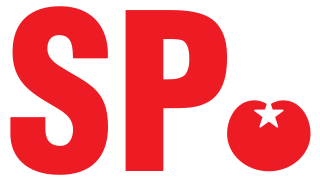The Labour Party is a social democratic political party in the Netherlands.

The Netherlands is a parliamentary representative democracy. A constitutional monarchy, the country is organised as a decentralised unitary state. The Netherlands can be described as a consociational state. Dutch politics and governance are characterised by a common striving for broad consensus on important issues, within both of the political community and society as a whole.
The Christian Union is a Christian democratic political party in the Netherlands. The CU is a centrist party, maintaining more progressive stances on economic, immigration and environmental issues while holding more socially conservative positions on issues such as abortion and euthanasia. The party describes itself as "social Christian".

The Christian Democratic Appeal is a Christian democratic and conservative political party in the Netherlands.
GroenLinks is a green political party in the Netherlands.

Democrats 66 is a social liberal and progressive political party in the Netherlands, which is positioned in the centre of the political spectrum. It is a member of the Liberal International (LI) and the Alliance of Liberals and Democrats for Europe (ALDE).

The Socialist Party is a democratic socialist and social democratic political party in the Netherlands. Founded in 1971 as the Communist Party of the Netherlands/Marxist–Leninist, the party has since moderated itself from Marxism–Leninism and Maoism towards democratic socialism and social democracy.

The Party for the Animals is a political party in the Netherlands. Among its main goals are animal rights and animal welfare. The PvdD was founded in 2002 as a single-issue party for animal rights, opposing animal cruelty and the treatment of animals in agriculture. The party then developed into a left-wing, ecological party.

The Political Party of Radicals was a Christian-radical and green political party in the Netherlands. The PPR played a relatively small role in Dutch politics and merged with other left-wing parties to form GroenLinks in 1991.

General elections were held in the Netherlands on 22 November 2006, following the fall of the Second Balkenende cabinet. The election proved relatively successful for the governing Christian Democratic Appeal (CDA) which remained the largest party with 41 seats, a loss of only three seats. The largest increase in seats was for the Socialist Party (SP), which went from nine to 25 seats. The main opposition party, the social democratic Labour Party (PvdA) lost nine of its 42 seats, while the right-liberal People's Party for Freedom and Democracy (VVD) and the progressive liberal Democrats 66 lost a considerable portion of their seats, six of 28 and three of six, respectively. New parties, such as the right-wing Party for Freedom (PVV) of former VVD MP Geert Wilders and the animal rights party Party for the Animals (PvdD) were also successful, with the PVV winning nine seats and the PvdD winning two, thereby becoming the first animal rights group to enter a European parliament.

Municipal elections were held in the Netherlands on 7 March 2006. About 11.8 million people could vote in 419 municipalities. Due to municipal reorganisations, 15 municipalities held elections in January 2006 and 24 municipalities held elections in November 2006. In some cities, such as Amsterdam, there were two elections, for the municipality and for the borough councils.
Following the 2006 Dutch general election, held on November 22, a process of cabinet formation started, involving negotiations about which coalition partners to form a common programme of policy and to divide the posts in cabinet. On February 22, 2007 it resulted in the formation of the Fourth Balkenende cabinet.

Provincial elections were held in the Netherlands, on 7 March 2007. The election also determined the members of the Senate, since the 564 members of the twelve provincial councils elect its 75 members. This election took place on 29 May 2007.

General elections were held in the Netherlands on Wednesday 15 March 2017 to elect all 150 members of the House of Representatives.

An election of the Members of the European Parliament from the Netherlands was held on 22 May 2014. This is the 8th time the elections have been held for the European elections in the Netherlands.

Provincial elections were held in the Netherlands on Wednesday 18 March 2015. Eligible voters elected the members of the States-Provincial in the twelve provinces. These elections also indirectly determined the members of the Senate, since the 566 members of the twelve States-Provincial will elect the Senate's 75 members in the Senate election on 26 May 2015. These provincial election were held on the same day as the 2015 Dutch water boards elections.

General elections were held in the Netherlands from 15 to 17 March 2021 to elect all 150 members of the House of Representatives. Following the elections and lengthy coalition formation talks, the sitting government remained in power.

Following the Dutch general election on 17 March 2021, a cabinet formation led to the establishment of the fourth Rutte cabinet in 2022. The coalition included the People's Party for Freedom and Democracy (VVD), Democrats 66 (D66), Christian Democratic Appeal (CDA) and Christian Union (CU), the same parties from the preceding third Rutte cabinet. This formation process, lasting 299 days, was the longest formation in Dutch history.
An election to the Dutch Senate was held on 30 May 2023. The 75 members of the Senate were elected by members of the provincial councils and electoral colleges elected two months earlier in provincial and electoral college elections.












